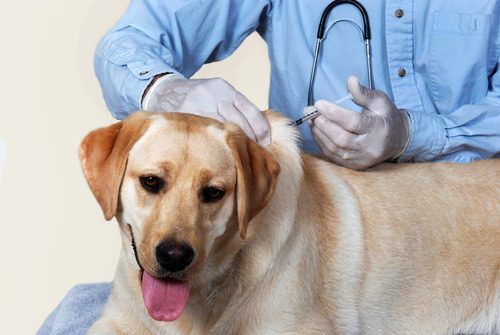How Long Do Dog Vaccines Last?
When it comes to protecting your dog’s health, staying on top of their vaccination schedule makes a significant difference. But many pet owners wonder: how long do dog vaccines last? Whether you’re welcoming a new puppy or managing an adult dog’s preventive care, knowing when boosters are needed is an important part of responsible pet ownership. In this blog, we’ll explore how long various dog vaccines typically last and why sticking to a vet-recommended schedule benefits your pet’s long-term health. If you have questions or want to schedule your dog’s vaccines, call Groveport Canal Animal Hospital at (614) 836-3222 or book an appointment online today!

Why Vaccinations Matter for Dogs
Vaccines prepare your dog’s immune system to recognize and defend against specific diseases. They help reduce the risk of serious illnesses that can spread quickly among pets—and sometimes to people. Even indoor dogs need protection, as exposure can happen unexpectedly through brief outdoor trips, visits to grooming salons, or contact with other animals. By maintaining a regular vaccination schedule, you help ensure your dog stays healthy and protected. How long dog vaccines last depends on the type of vaccine, your dog’s age, health status, and lifestyle factors.
Core Vaccines and How Long They Last
Core vaccines are recommended for nearly every dog, regardless of age, breed, or lifestyle. These vaccines protect against life-threatening diseases that are widespread and highly contagious.
Rabies Vaccine
The rabies vaccine is legally required for dogs in most areas, including Ohio. It protects against a deadly virus that affects the nervous system and can be transmitted to humans.
- First Rabies Vaccine: Typically given at around 12-16 weeks of age.
- Booster Timing: A second dose is usually required one year after the initial vaccination.
- Longevity: After the first booster, many rabies vaccines are effective for three years, though some require annual boosters depending on the brand and local regulations.
Distemper, Parvovirus, Hepatitis (DHPP)
The DHPP vaccine combines protection against multiple serious diseases, including distemper, parvovirus, adenovirus (hepatitis), and parainfluenza.
- Puppy Series: Puppies usually receive multiple doses, starting at 6-8 weeks old, then every 2-4 weeks until around 16 weeks.
- Booster Timing: A booster is needed one year after the initial series.
- Longevity: After the one-year booster, the DHPP vaccine often lasts for three years before another booster is needed.
Lifestyle Vaccines and Their Duration
Lifestyle, or non-core, vaccines are recommended based on your dog’s environment, travel habits, and activities. Some vaccines in this category have a shorter duration of effectiveness and may require more frequent boosters.
Bordetella (Kennel Cough)
The Bordetella vaccine protects against kennel cough, a common respiratory infection in dogs.
- First Dose: Puppies can be vaccinated as early as 6-8 weeks old, depending on the vaccine type (oral, intranasal, or injectable).
- Booster Timing: Boosters are often given every 6 to 12 months, especially for dogs who board, attend daycare, or visit grooming salons frequently.
Leptospirosis
The leptospirosis vaccine protects against a bacterial infection that can affect the liver and kidneys—and can also spread to humans.
- First Series: Typically given as a two-shot series, spaced a few weeks apart.
- Booster Timing: An annual booster is recommended, especially for dogs exposed to wildlife, standing water, or rural environments.
Canine Influenza
The canine influenza vaccine guards against two strains of the dog flu virus.
- First Series: Two doses given 2-4 weeks apart.
- Booster Timing: Annual boosters are typically recommended for ongoing protection.
Lyme Disease Vaccine
The Lyme disease vaccine protects against an infection transmitted by ticks.
- First Series: Two initial doses, given 2-4 weeks apart.
- Booster Timing: Dogs at risk (those in wooded or grassy areas) should receive a booster yearly.
Factors That Influence How Long Dog Vaccines Last
Several factors affect how long dog vaccines last and how often boosters are needed. Your veterinarian considers these factors when designing a vaccination plan.
Age and Immune System Health
Puppies, seniors, and dogs with weakened immune systems may need vaccines more frequently. Puppies require multiple booster shots to build strong immunity, while older dogs may experience changes in immune response that call for closer monitoring.
Lifestyle and Environment
Dogs that travel, attend dog parks, or visit groomers are often exposed to higher levels of risk. These pets may need more frequent protection against respiratory illnesses or tick-borne diseases.
Vaccine Type
Different brands and types of vaccines vary in their duration. Some are labeled for one-year protection, while others provide immunity for three years or more. Your veterinarian selects vaccines based on your dog’s specific needs and health history.
Regional Disease Risks
In certain regions, some diseases are more prevalent. For instance, dogs living in areas with high tick populations might require annual Lyme disease boosters, even if other vaccines are needed less frequently.
How Vaccine Schedules Are Developed for Dogs
Vaccination schedules aren’t one-size-fits-all. Your dog’s schedule is developed based on:
- Veterinary guidelines (such as those from AAHA and AVMA)
- Local regulations
- Your dog’s health history and lifestyle
- Type of vaccine used
During your dog’s wellness exams, your veterinarian reviews their vaccination history and assesses whether they are due for any boosters. Staying on schedule helps prevent lapses in protection. If you’re unsure when your dog’s vaccines are due, Groveport Canal Animal Hospital can review your pet’s records and provide a customized vaccination plan.
Recognizing When Your Dog Might Need a Booster
It’s helpful to watch for common signs that it might be time to review your dog’s vaccination status:
- It’s been a year or more since their last vaccine.
- You plan to board them, enroll them in daycare, or take them to a groomer.
- You’re traveling across state lines or internationally (travel often requires proof of recent vaccinations).
- You’ve adopted a dog with an unknown vaccine history.
Keeping up with your dog’s vaccines builds a strong foundation for their lifelong health. If you are wondering how long dog vaccines last or when your dog’s next boosters are due, the team at Groveport Canal Animal Hospital is glad to help. We can review your pet’s records, recommend a personalized vaccination schedule, and answer any questions you have about protecting your dog year-round. Call us today at (614) 836-3222 or book an appointment online to get started!

